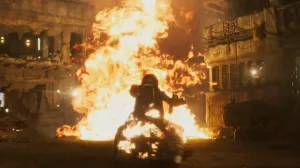A key component of being a stunt double is that you shouldn’t draw too much attention to yourself when you’re doubling for a film’s star, as you want to maintain the illusion that the character is the one undergoing extreme activities. While stunt performer Zoë Bell largely mastered this skill, her work doubling for Uma Thurman on Quentin Tarantino’s Kill Bill films was so riveting, he enlisted Bell to star in his film Death Proof, allowing her to show off not only her impressive stunt abilities but also her on-screen charm and charisma. Bell continues to play a pivotal part in films both behind-the-scenes and on-screen, with her latest project, Haymaker, landing in theaters and on VOD and Digital HD on January 29th.
Videos by ComicBook.com
Haymaker follows a retired Muay Thai fighter (Nick Sasso) working as a bouncer, who rescues an alluring transgender performer (Nomi Ruiz) from a nefarious thug, eventually becoming her bodyguard, protector, and confidant. The relationship leads Sasso’s character to make an unexpected return to fighting, risking not only his relationship, but his life. Haymaker tells a story about human dignity and love.
ComicBook.com recently caught up with Bell to discuss what drew her to Haymaker, taking on multiple roles in the film industry, and what remains on her professional bucket list.

ComicBook.com: Just to get this out of the way early, I have to say that Death Proof is awesome and you are awesome in Death Proof. It’s one of my favorite Tarantino films.
Zoë Bell: Oh yeah, it’s because you’ve got great taste. That’s why.
I’ve gotta be honest, I love how that movie wraps itself up, but I can’t help but hope to see you and Rosario Dawson and Tracie Thoms do another movie where you kill terrible men. Even if it’s just a documentary of you three actresses doing that.
Yes, I know. I’d love for that to not be a documentation of what’s really happening, I’d much prefer just to get paid to fake it, but yeah. I understand the interest.
What’s cool about your career, which can be said of Haymaker, is that you sometimes are a stunt coordinator, other times you perform the stunts personally, and other times you are an actor playing a character. What is the process of figuring out what role you’ll play in a project? Do you distinguish your interest in a project early on or do you generally express your involvement and then those discussions take place that flesh out your involvement?
It’s so different for each project, but something like Haymaker, for example, I think [writer/director/star Nick Sasso] approached me first about playing Rosie. It’s so amazing how long ago some things feel. But, for me then, I think with him, we started talking as if I was a consultant, just simply I was talking him through the differences in real fighting versus screen fighting, because the difference with real fighting is you’re trying to take someone down and have that be permanent. With screen fighting, you’re trying to make it look like you’re taking them down, but the intention is that they get back up so you can make another take. So there’s quite a lot of that going on. That was quite organic, the way it ended up happening.
Then I was like, “Well, why don’t I come out a couple of days or a week early, and I’ll work with you guys, and I can help you with choreography.” So that was quite an organic thing, but usually … I love acting. It’s really fun. Now that I don’t have this feeling of, “I must make it as an actor,” the joy levels have rocketed. For me, too, with acting, it’s about the character, and it’s about the director. It’s about the story. And if there’s a character I love in a story that I love being directed by someone that I trust, then yeah, I want to be in it, but I’m not going to negotiate an acting role in the film unless that particular character, for whatever reason, speaks to me. It’s all pretty organic. The bigger my acting role, the less likely I am wanting to take on too many roles in terms of coordinator or what have you, because once I’m in the role of stuntman, if you will, it’s a different switch in my brain from emotional creativity to physical storytelling creativity.
So with Haymaker specifically, what was it that got you so interested? Was it this specific story? The filmmakers involved?
Well, it was definitely the combo. To be honest, a big part of it that was appealing to me was, when I first read the script, there was no preamble or preaching or pushing the fact that the female lead is a trans woman, so by the time I started to piece it together, I was like … I think it’s a game-changer when you have a movie that’s a love story about a pop star and a Muay Thai fighter, and the pop star happens to be trans. That’s a game-changer when it’s not a “trans movie.” Now, obviously, it’s going to be an important part because, I mean, those movies just follow the same text. The trans pop star female lead is a real pop star, and she is trans, and Nick worked his ass off and is an amazing Muay Thai fighter, and they shot a bunch of their stuff in Thailand with real Muay Thai fighters.
There was just an authenticity to it, that had twists, one of the leads is trans, which is, sadly at this point, unexpected. I didn’t feel condescended by it. It didn’t feel contrary. It didn’t feel intentional, like, “Oh, we’re going to make a ‘trans movie’ because that’s all the rage.” The important stories in this movie are a love story and a coming-of-middle-to-old-age story of a fighter. So, I don’t know. I loved that it was such a big concept in such a small, real, grounded story. It’s a love story.
I get what you’re saying. You appreciated that a trans woman was a key part of the story, but it wasn’t a pandering emphasis on that, she was just one component of this bigger story.
Well, it’s tricky to word it. To speak to that, it almost takes away from what I think is so dope about it. It’s like having a badass action film, and then the lead character is a female and just calling it a “dope action movie,” instead of it being a “dope female action movie.” Do you know what I mean?
Yeah, I totally see what you mean. And whether it be with Haymaker or any other project you get involved with, from a stunt coordinator perspective, what do you think is the hardest thing for actors to authentically pull off that comes more naturally to stunt performers? Something that actors have a harder time learning on set?
Interesting question. Yeah, I think it’s an interesting question because the reality is, for me, our job as stunt performers and coordinators, I believe, is to have the actor learn as much as they possibly can that they’re comfortable with, so that they can stay acting in it. If they’re thinking too hard about the choreography, then they come out of character, then that’s on me, as well. If all they can do is throw a left hook really well, then let’s have them do that and build that into the fight. One of the things that I think is really important to work on with actors is footwork because I think if you’re an actor that is unaccustomed to doing action stuff and fight stuff, particularly fight stuff, it’s the footwork that will often get people confused.
They remember where their hands are meant to be going, but if they confuse their right and their left, now they’re off balance, and they feel discombobulated, and then they forget the choreography, and then they can’t remember their dialogue. And so, if you get them feeling comfortable in their footwork, then we can work around the rest of it. But footwork is one of those things that comes with experience. You know the best place to put your feet. It’s like falling. If you’ve got lots of experience falling, you have spatial awareness, and you can’t verbally teach spatial awareness.
You’ve already done a number of awesome things that your peers would be envious of, starring in Tarantino films and working on Marvel projects, but do you have any bucket-list things that you’re still looking to cross off? Whether it be joining a franchise like Star Wars or a specific performer or filmmaker you want to work with?
I’m getting into directing. So I’ve done a couple of commercials, and I’m now on the hunt for the ideal directorial-debut feature film, so that’s where I’m going. I’m culminating all the different paths that you’ve said. My career has taken me in lots of different directions, so I’m just going to put all of that in a big pot and use it all, sitting in the director’s chair. So I’m really excited about it.
Well, hey, I know Tarantino only said he’s directing one more movie so if he’s not directing a Death Proof sequel, I’d just like to put that idea out there.
No, no, I’ve definitely … all the things get considered. Why not? What’s the harm in considering all the things?
*****
Haymaker lands in theaters and on VOD and Digital HD on January 29th.
This interview has been edited for length and clarity. You can contact Patrick Cavanaugh directly on Twitter.








